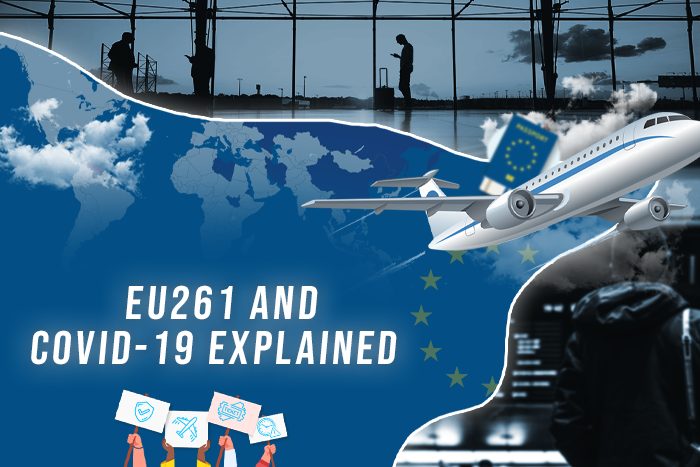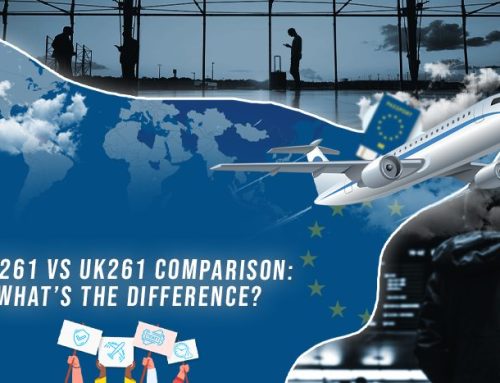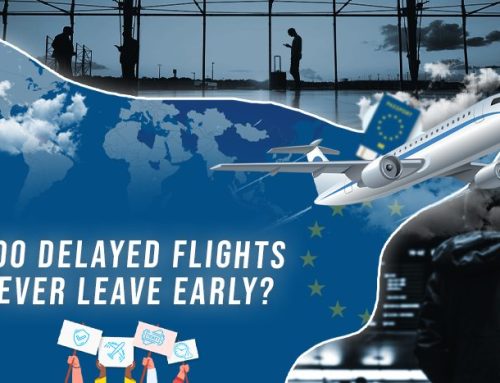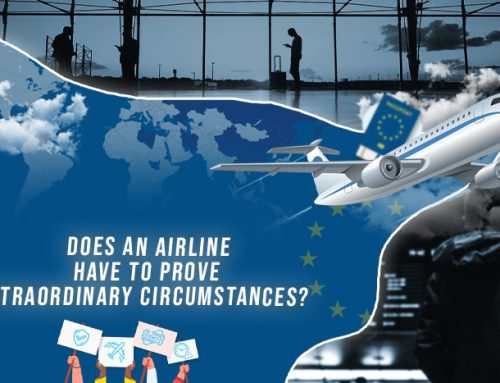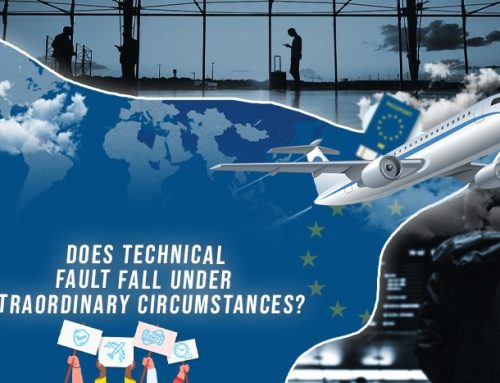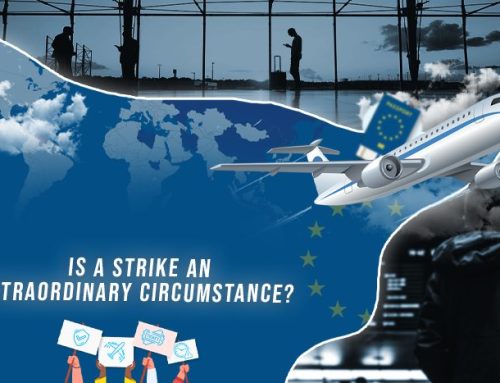These are unprecedented times. The COVID-19 outbreak has derailed plans, shaken the world economy, and left many travellers feeling out of sorts. Air carriers have also been hit hard due to strict containment measures enacted by public authorities, including lockdowns, shelter in place orders, quarantine zones, and travel restrictions. Generally, these measures need to be taken to ensure public safety, but they can leave travellers to deal with cancelled or redirected flights, many of which may not be able to be rebooked.
To help guide airlines and travellers the EU commission has issued a guideline to help with interpreting regulation (EC) No 261/2004, which lays out EU passenger rights and compensation regulation in the event of denied boarding, cancellations, or long delays of flights. However, in the context of the ever-developing COVID-19 situation, some aspects of EU261 will need to be reinterpreted. Below, we’ll explain passenger rights during the COVID-19 situation under EU261.
Key Takeaways
- Passengers are not entitled to compensation if a flight is cancelled due to COVID-19 restrictions, but carriers are still encouraged to offer other options such as reimbursement or rerouting.
- Passengers have a right to choose between reimbursement and rerouting, but rerouting may not always be possible due to travel restrictions and uncertainties involved in the decision.
- If a passenger cannot or will not travel due to COVID-19 concerns, whether they are reimbursed will depend on the carrier’s terms and conditions, but many carriers are offering vouchers for future trips.
- Carriers must still adhere to the right-to-care guidelines outlined in Article 9 of the Regulation, which includes providing meals, accommodations, and transport to passengers affected by a cancelled flight due to COVID-19.
- The COVID-19 situation has led to some aspects of EU261 needing to be reinterpreted, and the EU commission has issued guidelines to help airlines and travelers navigate passenger rights during this unprecedented time.
Do I Have A Right To Compensation During COVID-19?
In normal times, EU261 grants passengers the right to a fixed sum compensation when a flight is cancelled. Note that this does not apply to cancellations that are made more than 14 days in advance or cancellations caused by ‘extraordinary circumstances’ that could not have been avoided even when all preventative measures had been taken.
During the COVID-19 outbreak, the Commission has made clear that when public authorities enact strict measures intended to contain the spread of COVID-19, that these measures are by their nature not a normal practice enacted by the carriers and that these measures are fully outside of their control. Due to the extraordinary circumstances of COVID-19 and the measures put in place to protect the public, passengers are not entitled to compensation if a flight is cancelled due to COVID-19 restrictions.
Keep in mind, even though passengers will not be entitled to any flight compensation, the air carrier in question is still encouraged to offer passengers other options. Let’s take a look at options laid out by the Commission during the COVID-19 outbreak.
The Right To Choose Between Reimbursement and Rerouting
During the COVID-19 outbreak, the Commission has stated that passengers have a right to choose between reimbursement and rerouting from their air carriers. In the case of cancellation or certain delays, carriers must offer these options, as well as the option to reroute the flight. However, re-routing can be tricky, as the circumstances of COVID-19 have an incidence on the right to choose re-routing at the “earliest opportunity.”
Unfortunately, most carriers may find it impossible to re-route a passenger to an intended destination within a certain time frame due to travel restrictions. In the same vein, it may not be clear when re-routing will open up as a viable option. In this way, the “earliest opportunity” for rerouting may be subject to uncertainty or lengthy delays. If this is the case, passengers do have the option for reimbursement of the ticket price or re-routing at a later stage “at the passenger’s convenience.”
If a passenger does insist on being rerouted at the earliest opportunity, rather than taking a reimbursement, the air carrier must inform passengers about any delays or uncertainties involved in this decision. Should a passenger still choose to be rerouted, the air carrier legally has fulfilled its obligation to provide information and will in good time, book a flight available for rerouting.
When A Passenger Cannot or Will Not Travel?
COVID-19 has made air travel a rather daunting prospect for many travellers. Additionally, quarantine measures have made it necessary for some traveler to suspend travel plans if they contract the virus or came into contact with someone who tested positive. Others simply fear traveling when infection rates are high. What happens when a passenger cannot travel or will not travel due to concerns?
The Passenger Rights Regulations set forth by the EU do not discuss the slew of conditions in which a passenger cannot travel or may want to cancel a trip on their own volition. What does this mean for the passenger? In this incident, whether a traveler is reimbursed will bank on the sort of ticket (reimbursable, the prospect to rebook) as indicated in the carrier’s particular terms and conditions. However, due to the nature of the situation, many carriers have chosen to offer vouchers to passengers who cannot or will not travel due to the COVID-19 outbreak.
These vouchers can be redeemed for another trip with the same carrier in a certain timeframe established by the individual carrier. Keep in mind that this situation will need to be distinguished from a situation in which the carrier cancels the journey and only offers a voucher rather than a choice between reimbursement or rerouting. If the carrier cancels a flight due to COVID-19, passengers are still entitled to opt for reimbursement or rerouting instead.
Right To Care Guidelines
Even during the COVID-19 outbreak, EU261 still ensures that carriers must adhere to the right to care guidelines as outlined in Article 9 of the Regulation. Passengers who affected by a flight cancellation due to COVID-19 must be offered care by the air carrier, without charge or hassle. Care includes meals and refreshments within relation to waiting time, hotel accommodation if necessary, and transport to a place of accommodation. Additionally, individual airports are tasked with providing assistance to any passengers who are disabled or dealing with reduced mobility restrictions.
Keep in mind, that if a passenger chooses to opt for reimbursement in the event of a cancelled flight, the right to care does not stand. This is also true when a passenger chooses re-routing at a later date. The right to care only stands as long as passengers have to wait for rerouting at the earliest convenience and within a given time parameter. If a passenger chooses to re-routing at a later date, carriers are not responsible for providing accommodations or food for an indiscriminate amount of time.
Things To Remember
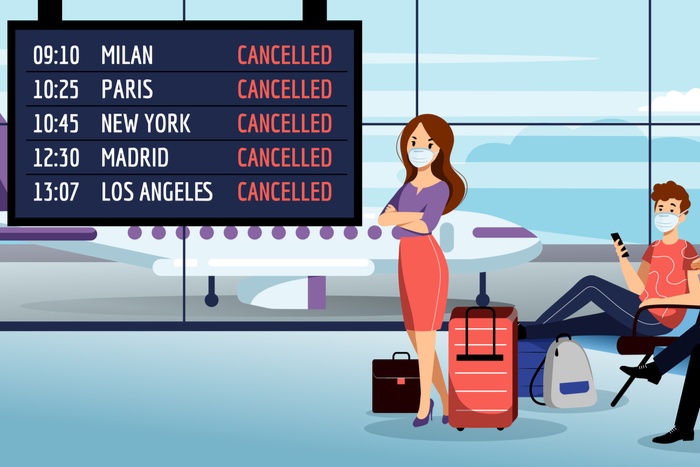
COVID-19 has upended the sense of normalcy in a myriad of ways. Both carriers and passengers are learning to adjust to this new way of life. As we all deal with public restrictions, the interpretation of the above guidelines will surely leave many questions unanswered. Since some nations will choose to deal with carriers and flight issues individually, it will be up to those courts to establish the extent to which the air carriers must oblige by regulation EU261/2004 during the COVID-19 outbreak.
Frequently Asked Questions
-
What is EU261 and how does it relate to Covid-19 travel disruptions?
EU261 is a regulation that outlines the rights of air passengers in case of flight cancellations or delays, including those caused by Covid-19.
-
Are airlines required to compensate passengers for flight cancellations due to Covid-19?
Yes, airlines must provide compensation in accordance with EU261 regulations, although there are exceptions and limitations.
-
Can airlines avoid compensation by claiming extraordinary circumstances due to Covid-19?
Airlines can claim extraordinary circumstances, but the burden of proof lies with them, and Covid-19 is unlikely to be considered an extraordinary circumstance in all cases.
-
Are passengers entitled to a refund if their flight is cancelled due to Covid-19?
Yes, passengers are entitled to a refund or rebooking, depending on their preference.
-
How can passengers ensure they receive their entitled compensation or refund?
Passengers should familiarize themselves with their rights under EU261, keep copies of their travel documents and communication with the airline, and seek assistance from organizations such as national enforcement bodies or consumer groups if necessary.
